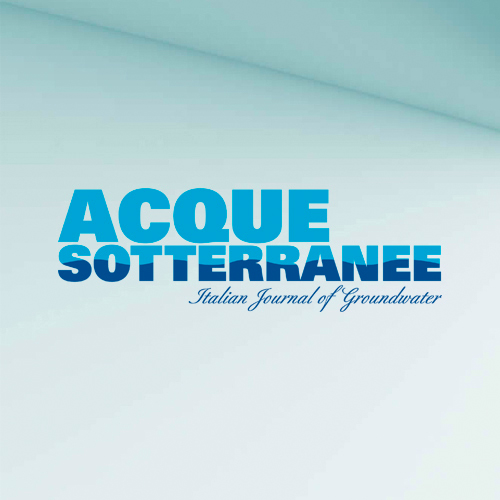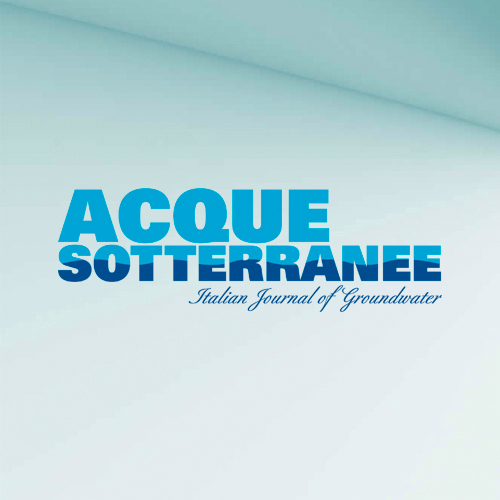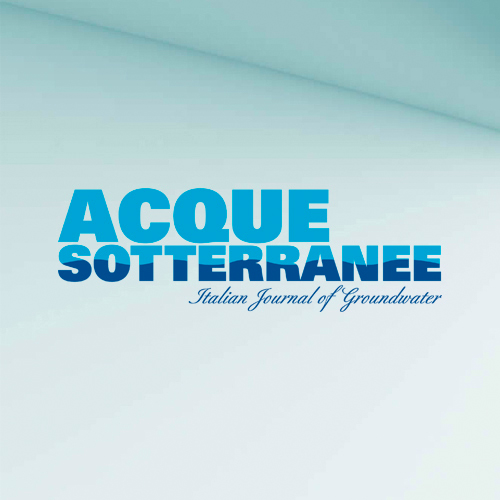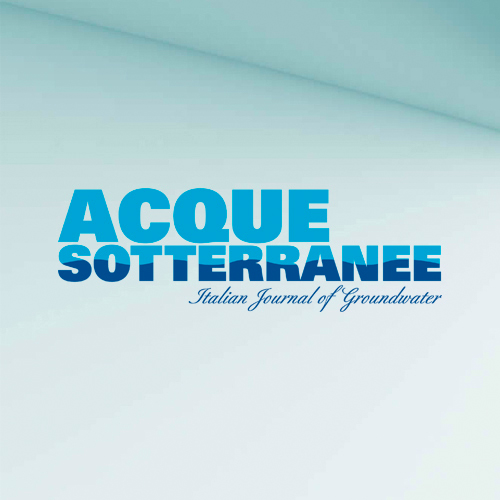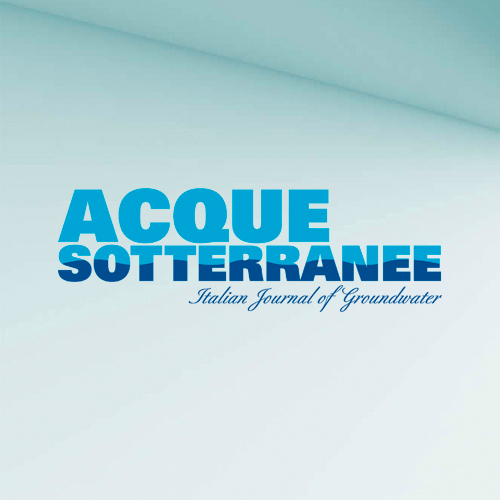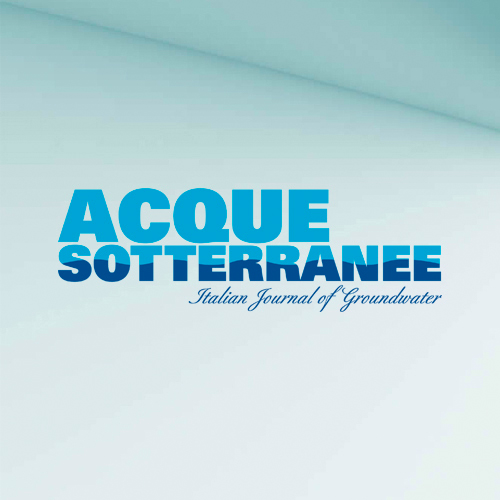About the Journal
Acque Sotterranee - Italian Journal of Groundwater is one of the oldest European journal dealing with groundwater. Papers on today widespread subjects, such as groundwater remediation and ground source heat pumps, were already published back in 1984.
Since June 2012 the former Acque Sotterranee is named Acque Sotterranee - Italian Journal of Groundwater (AS/IT JGW), with a new editorial form, publishing peer-reviewed scientific and technical papers in English or Italian. The journal deals with the multiple aspects of groundwater resources, from drilling technologies to contamination, groundwater/surface water interaction, hydrogeochemistry, numerical modelling, etc. A special attention is devoted to the Italian regional and socio-economic context, as well as to the Mediterranean countries ad more in general to the EU area and its border countries. Its goal is to link together the academic world, professionals, authorities, private and public companies by presenting up to date scientific and technical papers. Notwithstanding, contributions of authors from other continents have a key role in the spread of common experiences.
The published papers concern description of hydrogeological systems, water resource management, natural system dependence on groundwater, climate change, drilling and abstraction, contamination hydrogeology, groundwater remediation technologies, hydrogeophysics, agrohydrology, geothermal energy production, socio-economical dependence and anthropogenic impact on groundwater systems, groundwater monitoring, just to name a few.
The online Journal is Open Access and it is published four times per year (March, June, September and December). Each number presents: 4/6 scientific papers or technical report in English and/or Italian; technical and historical invited news column (legislation, hydrogeophisics, hydrogeochemistry, modeling, etc.); technical notes on drilling techniques and water wells. The journal accepts original papers (peer reviewed), technical reports (peer reviewed), technical notes (not peer reviewed). Submitted papers undergo a double blind review and the Editors in Chief guarantee a short-time response on the editorial decision (60 days) since the date of receipt. Publication of accepted contributions is free of charge.
Acque Sotterranee - Italian Journal of Groundwater obtained the patronage of the National Association of Hydrogeology and Water Wells (ANIPA), of the Italian Chapter of the International Association of Hydrogeologists (IAH-Italy) and of the Geological Survey of Italy (ISPRA).
Introduction
Peer review is applied to all research articles published in Acque Sotterranee - Italian Journal of Groundwater. This usually entails at least two independent, expert peer reviewers.
Policy
All submissions to Acque Sotterranee - Italian Journal of Groundwater are first checked for completeness (criteria for desk reject are available in the Guide for Authors) before being sent to an Editor, who decides whether they are suitable for peer review. If an Editor is on the author list or has a competing interest in a particular manuscript, another member of the Editorial Board will be assigned to oversee peer review. When making a decision, Editors will consider the peer-reviewed reports, but they will not be bound by the opinions or recommendations contained in them. A single peer reviewer's or the Editor's concern may result in the manuscript being rejected. Peer review reports are sent to authors along with the editorial decision on their manuscript.
At Acque Sotterranee - Italian Journal of Groundwater papers undergo a single-blind review process - meaning that the reviewers’ identity is not shared with the authors.
Selection
Peer reviewer selection is critical to the publication process. A variety of factors influence it, including expertise, reputation, specific recommendations, conflicts of interest, and previous performance. All of these qualities are highly desirable: speed, thoroughness, sound reasoning, and collegiality.
Before accepting an invitation to review a manuscript, potential peer reviewers should notify the Editor of any potential conflicts of interest. Editors' and peer reviewers' communications contain confidential information that should not be shared with third parties.
Acque Sotterranee - Italian Journal of Groundwater is committed to making editorial decisions and publishing them as soon as possible, and we believe that an efficient editorial process benefits both our authors and the research community as a whole. As a result, we ask reviewers to respond within the agreed-upon time frame. If reviewers anticipate a delay, we ask that they notify us so that we can keep the authors updated and, if necessary, find alternative solutions.
Diversity and equity
Acque Sotterranee - Italian Journal of Groundwater is committed to diversity, equity, and inclusion, and strives for demographic diversity among peer reviewers. When inviting peer reviewers, editors are bly encouraged to consider geographical regions, gender identities, racial/ethnic groups, and other groups.
Misconduct
False or misleading information, such as identity theft and suggesting fake peer-reviewers, will result in the manuscript being rejected, further investigation in accordance with PAGEPress' misconduct policy (https://www.pagepress.org/site/plagiarism_misconduct), and notification to the authors' institutions/employers. PAGEPress journals follow the Committee on Publication Ethics (COPE) guidance about peer reviewer fraud/falsification.
Guidance
The primary goal of peer review is to provide the Editor with the information needed to make a fair, evidence-based decision that adheres to the journal's editorial criteria. Review reports should also assist authors in revising their paper so that it can be accepted for publication. Reports that include a recommendation to reject the paper should explain the major flaws in the research; this will help the authors prepare their manuscript for possible re-submission (if allowed by the Editor) or submission to a different journal.
A quick guide to reviewing is available here
Before submitting a report, reviewers should ask themselves the following questions:
- How would you react if you received this report?
- Do you find the tone offensive?
- Is it polite and professional?
- Do the authors or their competitors receive any unnecessary personal or antagonistic remarks?
Please keep in mind that any offensive language in your report may be removed by the Editor.
All papers are published as soon as they have been accepted, by adding them to the "current" volume's Table of Contents.
Open Access publishing does have its costs. However, as a promotional activity, all articles accepted for publication in Acque Sotterranee - Italian Journal of Groundwater will be published completely exempt from any charge.
This journal provides immediate open access to its content on the principle that making research freely available to the public supports a greater global exchange of knowledge.
This journal utilizes the PKP Preservation Network, the Global LOCKSS Network and Portico to create a distributed archiving system among participating libraries and permits those libraries to create permanent archives of the journal for purposes of preservation and restoration.
PAGEPress allows and encourages authors to deposit both their pre- and post-prints in Open-Access institutional archives or repositories. The primary benefit of pre- and post-print self-archiving is reaching a larger audience which enhances the visibility and impact of your research.



